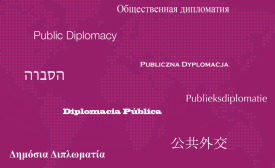public diplomacy
Almost 10 years after 9/11, the United States has a new window of opportunity to regain the initiative in the “missing battle” of the campaign against terrorism. That is, a sustained soft power effort to win the battle for hearts and minds in predominantly Muslim countries.
There are government agencies such as the police forces in Delhi, Indore and Meerut which use Facebook creatively to track crimes and keep citizens informed . The ministry of external affairs has come in for praise for using Twitter as a tool for public diplomacy. But such examples are few and far between.
Evidence of detainee abuse at Iraq's Abu Ghraib prison and the U.S. detention center at Guantanamo Bay... furthered the perception that the United States was at war with Islam - despite extensive public diplomacy campaigns by the State Department to portray America as a country where Muslims were not only free to worship, but were part of the American social fabric.
There is general agreement the core role of public diplomacy is to further foreign policy and to promote our national interests. The need to sustain a vibrant international education sector is clearly in our national interest.
Australia operates in a vacuum in international education and public diplomacy. But in their recent paper, Bond University researchers argue for more active public diplomacy leadership, improved evaluation and expanded dialogue within the sector and broader community. Such strategies would maximise the soft-power potential of Australia's international education and contribute to our future international positioning.

The sixth paper in the 2011 series of CPD Perspectives by CPD Research Fellow (2009-2011) Kathy R. Fitzpatrick has been released.
The 24-year-old host of "OMG Meiyu," a trendy, cross cultural English teaching feature produced by Voice of America’s Mandarin Service, has become an overnight sensation in China...More than 2-million people have now clicked on Jessica Beinecke’s quirky videos, which teach Chinese speakers about common English expressions used by young Americans.
A U.S. expert on the Middle East and public policy says the United States and other countries need to be engaged in the region to bring about peaceful changes. As fighting continues in Libya, Former Ambassador Edward Djerejian sees challenges ahead for the National Transitional Council as it seeks to create a new government there.







